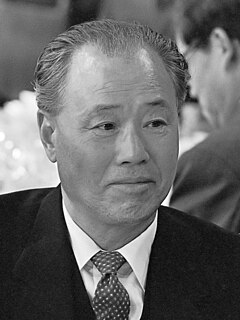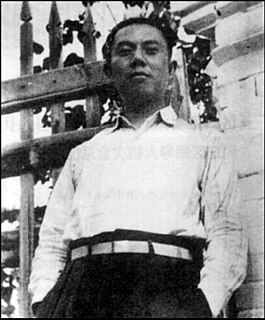
The Standing Committee of the Central Political Bureau of the Communist Party of China, usually known as the Politburo Standing Committee (PSC), is a committee consisting of the top leadership of the Communist Party of China. Historically it has been composed of five to eleven members, and currently has seven members. Its officially mandated purpose is to conduct policy discussions and make decisions on major issues when the Politburo, a larger decision-making body, is not in session. According to the party's Constitution, the General Secretary of the Central Committee must also be a member of the Politburo Standing Committee.

Zhao Ziyang was a high-ranking statesman in China. He was the third Premier of the People's Republic of China from 1980 to 1987, Vice Chairman of the Communist Party of China from 1981 to 1982, and General Secretary of the Communist Party of China from 1987 to 1989. He lost power in connection with the reformative neoauthoritarianism current and his support of the Tiananmen Square protests of 1989.

Wan Li was a Chinese Communist revolutionary and politician. During a long administrative career in the People's Republic of China, he served successively as Vice Premier, Chairman of the Standing Committee of the National People's Congress (NPC), and a member of the Communist Party of China (CPC) Secretariat and its Politburo.

Ching Cheong is a senior journalist with The Straits Times. He is best known for having been detained by the People's Republic of China on allegations of spying for Taiwan. He was imprisoned from April 2005 to February 2008; spending more than 1,000 days in prison.

The Democracy Party of China is a political party that started in the People's Republic of China, and was banned by the Communist Party of China (CPC). The history of the DPC and its foundation date is unclear because it has many historical paths under different groups of founders. It is generally recognized to have assembled in 1998 by democracy activists and former student leaders from the 1989 Tiananmen Square protests according to western sources.
Shi Tao is a Chinese journalist, writer and poet, who in 2005 was sentenced to 10 years in prison for releasing a document of the Communist Party to an overseas Chinese democracy site. Yahoo! China was later discovered to have facilitated his arrest by providing his personal details to the Chinese government. Yahoo! was subsequently rebuked by a panel of the U.S. Congress, settled a lawsuit by Shi's family out of court, and pledged to reform its practices.
A cyber-dissident is a professional journalist, an activist or citizen journalist who posts news, information, or commentary on the internet that implies criticism of a government or regime.

Bao Tong is a Chinese writer and activist. He was former Director of the Office of Political Reform of the Central Committee of the Communist Party of China and the Policy Secretary of Zhao Ziyang, Chinese Premier from 1980 to 1987 and CPC General Secretary from 1987 to 1989. He was also Director of the Drafting Committee for the CPC 13th Party Congresses, known for its strong support for market reform and opening up under Deng Xiaoping. Prior to this, he was a committee member and then Deputy Director of the Chinese State Commission for Economic Reform.
Zhao Yan is a Chinese researcher employed by the Beijing bureau of the New York Times. He was imprisoned for a three-year period starting 17 September 2004, on charges of fraud, after originally being arrested for revealing state secrets. According to the BBC, he was released on 15 September 2007.
Ouyang Yi is a former high-school teacher, one of the managers of a pro-democracy web site, and a member of the China Democracy Party.
The Tangshan protest occurred in 2004 after more than 11,000 farmers in Hebei Province, China signed a petition calling for the removal of Communist Party officials who were allegedly involved in corruption. The protest led to a crackdown on rights activists and further repression of the farmers.
Charter 08 is a manifesto initially signed by 303 Chinese dissident intellectuals and human rights activists. It was published on 10 December 2008, the 60th anniversary of the Universal Declaration of Human Rights, adopting name and style from the anti-Soviet Charter 77 issued by dissidents in Czechoslovakia. Since its release, more than 10,000 people inside and outside China have signed the charter.
Local Committee of China Democracy Party (LCCDP) is special committee of China Democracy Party with the aim to start democratic reform from local government in the People's Republic of China. The party was banned by the Communist Party of China (CPC). The Local Committee of CDP was established by Zheng Cunzhu, a former student leader in Anhui province in 1989 and a secret CDP member in China since 2001.
Liu Xianbin, from Suining, Sichuan province, People's Republic of China, is a human rights activist, China Democracy Party organizer, writer and signer of Charter 08.
Zhang Yi is a Chinese politician. He was the Director of the State-owned Assets Supervision and Administration Commission, and the former Communist Party Secretary of Ningxia Hui Autonomous Region.
Yang Rudai was a politician of the People's Republic of China (PRC). He served as the Communist Party Chief of Sichuan, then China's most populous province, and was the first native Sichuanese to become the top leader of the province since the founding of the PRC. He was a member of the 13th Politburo of the Communist Party of China, the top governing body of China. Yang was considered a protégé of the purged reformist leader Zhao Ziyang.

Deng Liqun was a Chinese politician and theorist who was one of the leading figures of the Communist Party of China during the 1980s, most well known for his involvement with the party's propaganda work. Deng was born in Guidong County, Hunan province, and joined the Communist Party in 1936. He came from an intellectual family and joined the party out of intellectual commitment. He was often referred to as "Little Deng", to be distinguished from Deng Xiaoping, the "Old Deng".







